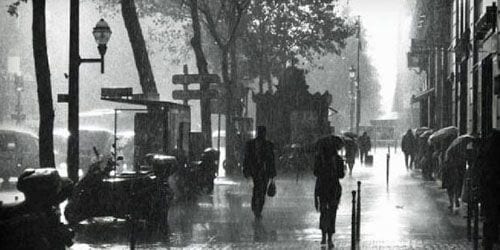
As it turns out, trying to review a book called Paris Was Ours — a collection of essays by variously literary glitterati on the ways the City of Lights has challenged their thinking and ultimately changed their lives — is problematic in prose terms. The imaginative impact, however, follows a neat progression:
- See book in review list, which happens to perfectly mirror your daydreams of becoming the next Proust. Or possibly Isadora Duncan, you haven’t decided yet. Hit ‘request’ before it gets too complicated.
- On book’s arrival, check out cover photo. Yes, it’s black-and-white. Yes, there are rain-washed streets, also possibly a lamp-post. Have uneasy realisation that this sort of thing is very, very familiar, up to and including that one Van Johnson movie where he leaned on pianos and angsted over Elizabeth Taylor until all you wanted to do was give him a firm smack upside the ear.
- Start to seriously wonder, given the current wired-into-reality state of the global village, how much of a need there remains for reminiscences of youthful European angst. Especially the American market, and especially after that Gallic best-seller re: how 9/11 was one huge government conspiracy.
- Begin reading the various essays. They are almost exclusively written by literary types, some quite alarmingly high up the ivory tower, thus vary in tone from bitingly realistic to mournfully elegiac. Most are self-aware enough to avoid outright pretentiousness… but then they don’t have to, do they? Paris: for centuries a collection of simple, seductive shorthands for no less than the meaning of life. An entire Revolution couldn’t erase the Paris of imagination; what chance does a random reader have?
- Continue reading, until it is undeniably clear that you will never, ever have hot sex after a discussion of the validity of obscure Czech philosophers in a little cafe while the rain pours down outside — let alone learn to tie a scarf correctly — and become frankly depressed. The innumerable (and, you notice even at the height of your reveries, a trifle repetitive) tales of student suffering, the priciness, the anecdotal evidence not only of deep cultural differences but the art form the French have made out of not excusing them — hell, the fact that you don’t even smoke — none of it dispels the magic…
…right up until you hit the essay by the homeless single mother, rather awkwardly plumped down right in the middle of the book. Also, as a kind of fine edge on the point, the pieces by the refugee from the Iranian Revolution and journalist set free from Cuba.
- Realise, with a tinge of shamed foolishness, that what Paris ultimately offers over any other place in the world is the irresistible chance to validate, then romanticise, one’s own self-interest.
Which reduces the majority of these reminisces to basically elegant, sophisticated navel-gazing — by default not nearly as interesting to reader as author. This may explain why there is a lot of wittiness going on here, but precious little real humour; in this mood, even David Sedaris seems to be trying just a trifle too hard.
- Begin to appreciate the independently-interesting bits: the ones actually propelled by a quest for cultural understanding (the most interesting thread running throughout involves the magnificently problematic Gallic attitude to romance, women & motherhood), excellence (among the many starry-eyed young writers is a fascinating tale of a young chef), or imagination (the stories of sojourns among the Middle Eastern community, or finding a bed at a legendary bookshop.)
So that in the end, the stories you value most are the ones you were most impatient with in the beginning: the ones who recognise that the ultimate point of Paris is coming to terms with reality.
As a literary experience for the authors, Paris Was Ours may fall something short; but as a journey of self-discovery for the reader… it may be surprisingly rich.

![Call for Papers: All Things Reconsidered [MUSIC] May-August 2024](https://www.popmatters.com/wp-content/uploads/2024/04/all-things-reconsidered-call-music-may-2024-720x380.jpg)



